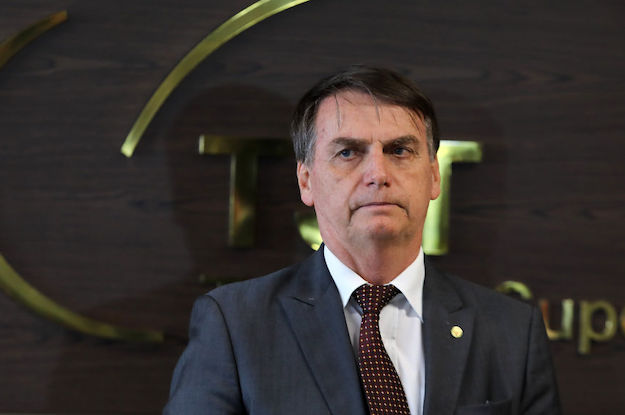Is a trade agreement in the cards between the Western Hemisphere’s two largest economies?
That’s a possibility offered by U.S. President Donald Trump after the election of a kindred spirit as the new leader of Brazil. Jair Bolsonaro will likely be one of Washington’s closest allies in the Americas, and a free trade agreement would provide a needed boost to Brazil’s struggling economy. It would also help address U.S. frustrations with Brazil’s high tariffs. But reaching such a deal with the South American giant will be no easy task.
For starters, there’s the matter of Brazil’s membership in Mercosur, a common market that also includes Argentina, Paraguay and Uruguay. Since 2000 the bloc is bound by an agreement that prevents its members from negotiating bilateral trade deals with other nations. Bolsonaro could try to strike out on his own, but such a move would inflict a mortal blow to Mercosur at a high political cost.
Instead, he should push for the start of FTA talks with the United States via the trading bloc. Although Argentina is not positioned to conclude such a deal given President Mauricio Macri’s current political struggles, the groundwork could be laid for an agreement to be reached should he be re-elected next year.
Encouragingly, Mercosur has recently begun to emerge from a long period during which it was dominated by left-wing governments that turned it more protectionist and politically-driven. Granted, it continues to struggle in achieving consequential trade agreements with other large countries or regional blocs – negotiations launched with the European Union in 1999 remain deadlocked – but it should not be assumed that talks with the United States would be condemned to the same fate.
Another obstacle that will have to be overcome is recent history between Brazil and the U.S. Brazil was the main culprit in the collapse of the negotiations for the U.S.-backed Free Trade Area of the Americas in the last decade. And while Bolsonaro’s economic team boasts economists that openly embrace free trade, the country’s main objections to a deal with the United States are not magically going to go away. These include U.S. agricultural subsidies, dismantling its own tariffs on industrial goods, and U.S. demands for expanded protections for intellectual property rights.
Agricultural subsidies particularly rankle. In fact, in 2014 the United States agreed to pay $300 million to Brazilian cotton farmers to resolve a WTO dispute over U.S. subsidies. The U.S. sugar program is another source of Brazilian ire. Access to the U.S. market by the world’s largest producer of sugar is greatly limited by a system that imposes punishing tariff levels after an import quota assigned to Brazil is filled.
Brazilian steel and aluminum exporters, meanwhile, feel aggrieved by the combination of tariffs and quotas imposed by the Trump administration earlier this year.
The United States has its own set of frustrations with Brazil, largely centered on nontariff barriers such as local content requirements. President Trump has also recently described the country as treating the United States in “very tough” fashion citing its “very big tariffs.” Perhaps more importantly, there is a sense that Brazil must first begin aligning its regulatory framework with the United States before the groundwork can truly be laid for free trade talks to take place.
Nonetheless, the countries would benefit greatly from a free trade deal. Brazil is already the United States’ 12th largest goods trading partner, and a pair of 2016 studies concluded that an FTA between the two countries could boost U.S. GDP by $24 billion and Brazil’s by $38 billion. That the United States ran a trade surplus in 2016 with Brazil of nearly $27 billion no doubt appeals to Trump.
There are numerous incentives for Brazil to pursue such a deal as well. President-elect Bolsonaro has repeatedly expressed wariness of Brazil’s largest trading partner China, and an FTA with the United States – the country’s second-largest partner – could be a means of orienting the economy away from Beijing. Perhaps more importantly, such an FTA would send a needed signal that pro-market rhetoric espoused by his leading economic adviser is backed by real substance.
Brazil’s recent conclusion of talks on a free trade agreement with Chile, an associate Mercosur member, could provide a template. Among the most comprehensive deals Brazil has negotiated, it may be an indication that Brasília is positioning itself to pursue the type of wide-ranging agreement the United States would likely demand. That the country, through Mercosur, also opened trade talks with Canada this year provides additional encouragement.
Brazil is still reeling from the effects of its worst economic crisis in history and badly needs structural reforms to avoid another downturn. Trade liberalization – including an FTA with the United States – would provide a much-needed confidence boost and contribute to tackling Brazil’s infamous high cost of living.
But what Brazil needs and what it can achieve may be two different things. The constraints imposed by membership in Mercosur are a serious roadblock to concluding an FTA, and Brazil’s political dysfunction is perhaps even more daunting. Indeed, while many Brazilians acknowledge the need for greater economic opening, breaking the logjam of entrenched interests and chaotic politics has repeatedly proved a bridge too far. Bolsonaro’s commitment to economic liberalization remains to be seen. But he also enjoys one of the strongest political mandates in Brazil’s democratic history. Let’s hope that he uses it for good.
—
Grabow is a policy analyst at the Herbert A. Stiefel Center for Trade Policy Studies, and Hidalgo is a policy analyst on Latin America at the Center for Global Liberty and Prosperity, both at the Cato Institute.






